Which Canon EF-S lens should you buy?
A good zoom or fixed focal length is what will make the difference between a just “good” picture and an incredible picture.
This selection of the best lenses compatible with Canon’s APS-C range of cameras will help you get the most out of your camera, whether it’s for portrait photography, macro photography (insects, flowers…) or finding the best Canon lens to take with you on a trip.
Note: Product links in this article lead to Amazon
Summary
- Pancake lenses
- Portraits
- Macro
- Wide angle
- Walk around (travel lenses)
- Zoom lenses
- Top 5 best Canon EF-S lenses
- Comparative table
- EF or EF-S?
- How to choose your Canon EF-S lens
PANCAKE LENSES
Canon EF-S 24mm f/2.8 STMG
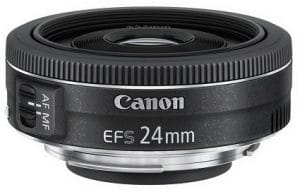
Filter size: 52 mm
The ideal lens for light travel: with only 2 cm thick, it perfectly deserves the name pancake. Designed for APS-C cameras, it’s suitable for street photography or even landscapes.
Sold for an affordable price, it’s not perfect but it provides a great image quality and it’s an ultra-compact and bright lens. Despite its small size it has an autofocus motor, but it does not have an image stabilizer.
Click to see the price
Canon EF 40mm f/2.8 STMG
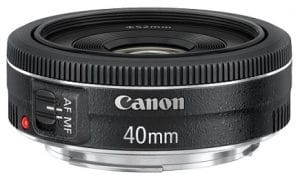
Filter size: 52 mm
Still in the pancake category, the 40mm f/2.8 is less than 3 cm long and weighs 130g, which means that it takes up very little space. Its relatively bright f/2.8 aperture allows shots to be taken in low light. It’s equipped with an EF mount and is therefore compatible with all Canon SLRs, APS-C as full-frame.
Its auto focus is fast and quiet, it offers good optical quality with a good and homogeneous sharpening, and low distortion. In short, it’s an ideal lens for a first experience with a fixed focal length. Be careful, it does not have optical stabilization.
Click to see the price
PORTRAITS
Canon EF STM 50 mm f/1.8
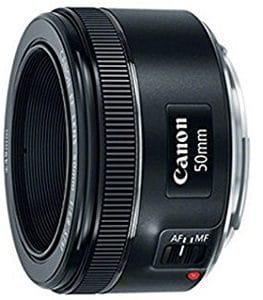
Filter size: 49 mm
This fixed focal length is easily transportable and discreet and is sold at a very attractive price. Too bad there is no integrated optical stabilization, but this lens is perfect for beginners who want to try a fixed focal length at a low price.
It’s not the top of the line in image quality, but its f/1.8 aperture allows you to get beautiful backgrounds with blur and take high quality low-light shots without the need for a flash. The STM autofocus is very quiet and smooth for video shooting.
Click to see the price_
MACRO
Canon EF 100 mm f/2.8 Macro L IS USM
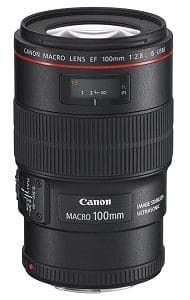
Filter size: 67 mm
Rather compact despite its long focal length, it’s a versatile lens that can also be used to take portraits. The sharpness is excellent in the center of the image. Designed for full-frame Canon cameras, it works perfectly well on Canon’s APS-C cameras and its focal range will turn into a 160 mm. It has a high-performance hybrid image stabilizer, essential for macro photography. Its constant aperture of f/2.8 allows you to take pictures in low-light conditions.
Like all models in Canon’s L range, it’s weather sealed. It’s supplied with a sun visor. Too bad it’s so heavy and expensive, but if you want to get serious about macro photography, that’s the goal you need.
Click to see the price_
WIDE ANGLE
Canon EF-S 10-18 mm f/4.5-5.6 IS STM
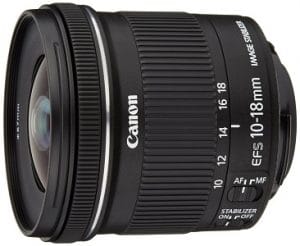
Filter size: 67 mm
The lens to have if you want to take landscape or architectural photos. It’s one of the most affordable wide-angle lenses available on Amazon.com. It’s also ultra compact and incredibly lightweight, ideal for taking it on a trip. It has integrated optical stabilization.
The image quality it offers is correct, the sharpness excellent, the distortion reasonable for a wide angle, in short it’s a very good choice to complete a Canon optical fleet.
Click to see the price_
WALK AROUND LENSES
Canon EF-S 18-200 mm f/ 3.5-5.6 IS
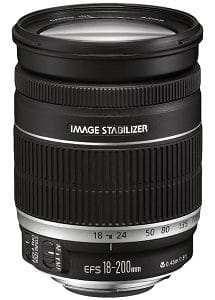
Filter size: 72 mm
A wise choice for those who don’t want to bother changing lenses depending on the situation, this hyper versatile lens with a very wide focal length is well finished and sold at a reasonable price. Be careful, as with all super-zooms, you will have to compromise on image quality.
Its optical performance is far from exceptional (marked distortion and good sharpness only from 28mm), but it has a high zoom range that will be practical when travelling and it incorporates a powerful optical stabilization system, as well as a fast and discreet autofocus.
Click to see the price
Canon EF-S 17-55 mm f2.8 IS USM
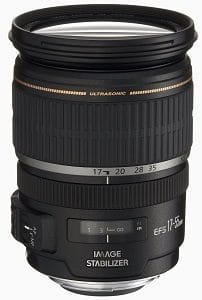
Filter size: 77 mm
An imposing lens that offers very good performance, interesting framing flexibility, and a fixed aperture of f/2.8 over the entire focal length range that will allow you to shoot in low-light conditions.
It has an image stabilizer and its focus is fast and accurate. It can give much better results than the 18-55 mm supplied as a kit. It’s a pity that at this price it’s not provided with a sun visor.
Click to see the price_
ZOOM LENSES
Canon EF-S 55-250 mm f/4-5.6 IS STM
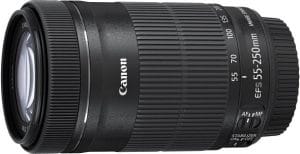
Filter size: 58 mm
For a lens in this focal range, it’s rather light, compact and does its job well thanks to the integrated optical stabilization that will allow you to take pictures by hand without the need for a tripod. It will perfectly complement your 18-55 mm or a fixed focal length. For the negative points, it’s a pity that it’s sold without a sun visor or cover.
Of course there is more in terms of image quality, but it’s sold at a more than reasonable price, and if it was not already supplied as a kit with your camera, feel free to take it to start remote photography.
Click to see the price
Canon EF 70-200mm f/4 L IS USM
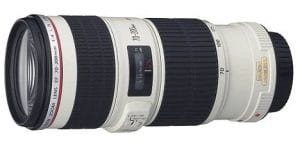
Filter size: 67 mm
The most expensive objective of this selection, however, it’s a little cheaper than the version with f/2.8, but also less cumbersome and lighter with a half as much weight. Even if its optical performance is not as good, this is an argument to be taken into account if you want to take it on a trip.
Designed for full-frame cameras, its focal length on an APS-C model will be equivalent to 112-320mm, useful for animal or sports photography. Its constant f/4 aperture allows you to take beautiful images. Like all L Series models, it’s weather sealed. It comes with a cover and a sun visor. A good choice if you go on a trip.
Click to see the price_
TOP 5 BEST CANON LENSES
Here is the top 5 best Canon lenses (leave a message if you disagree and explain why!)
If you only need one and have a small budget, choose without hesitation the 50 mm f/1.8. Compact, lightweight and at less than 150€ it offers an unbeatable price-quality ratio. To make images of a quality far superior to the one you get with the 18-55mm lens supplied as a kit, choose this lens.
If you want to have fun with a zoom lens without breaking the bank, opt for the 55-250 mm. If you have the budget and want to get serious about animal photography, enjoy the 70-200 mm f/4 for exceptional quality images.
If you want to take pictures of landscapes or monuments in a wide angle, choose the 10-18 mm.
Finally, if you are interested in photographing insects, flowers or (very) small objects, the 100 mm f/2.8 Macro is the right one for you. It’s a little expensive but it’s not only limited to macro photography, you can also make superb portraits with it.
COMPARATIVE TABLE
In this table you will find all the objectives mentioned on this page classified by price. These are indicated for information only, check on Amazon to see if they have decreased or increased.
| Lenses | Price | Weight | Aperture | Utility | Stabilization |
|---|---|---|---|---|---|
| Canon EF STM 50 mm /f 1,8 | $$$$$ | 160 g | f/1.8 | portrait | no |
| Canon EF 40mm f/2.8 STMG | $$$$$ | 130 g | f/2.5 | pancake | no |
| Canon EF-S 55-250 mm f/4-5,6 IS STM | $$$$$ | 375 g | f/4-5.6 | zoom | yes |
| Canon EF-S 24mm f/2.8 STMG | $$$$$ | 125 g | f/2.8 | pancake | no |
| Canon EF-S 10-18 mm f/4,5-5,6 IS STM | $$$$$ | 240 g | f/4.5-5.6 | wide angle | yes |
| Canon EF-S 18-200 mm f/ 3,5-5,6 IS | $$$$$ | 595 g | f/3.5-5.6 | all-in-one | yes |
| Canon EF-S 17-55 mm f2.8 IS USM | $$$$$ | 650 g | f/2.8 | all-in-one | yes |
| Canon EF 100 mm f/2,8 Macro L IS USM | $$$$$ | 625 g | f/2.8 | macro | yes |
| Canon EF 70-200mm f/4 L IS USM | $$$$$ | 760 g | f/4 | zoom | yes |
EF or EF-S?
EF stands for ‘Electro Focus’, the S stands for ‘Short back focus’.
Simply put, EF-S lenses are designed to be used only on Canon SLR cameras with an APS-C sensor, i. e:
- Canon 550D, 600D & 650D
- Canon 700D & 750D
- Canon 1100D, 1200D & 1300D
- Canon EOS 80D
- Canon 100D
If your Canon camera is included in this list, you can easily use the lenses mentioned in this article. EF lenses can also be mounted on APS-C SLRs without any problem and I have included some of them in this selection.
Full-frame cameras use a larger sensor than APS-Cs and are only compatible with EF-type lenses, not EF-S. If you put an EF-S lens on a full-frame camera, you get a large vignetting of the image because the field covered by the lens is too small to cover the entire sensor (roughly, the corners of the image are black).
Here are some models of full frame cameras:
- Canon EOS 5D MARK II, III, IV…
- Canon EOS 6D
- Canon EOS 5DS
- Canon EOS-1D X Mark II
The question is whether you plan to buy a full-frame camera in the future… maybe it’s worth investing in EF lenses? In any case, the lenses do not lose too much of their value if you intend to sell them second-hand.
To summarize this paragraph, simply remember that EF-S lenses are designed only for APS-C sensors (small sensor) and EF lenses for full-frame sensors but also APS-C.
The advantages of EF-S lenses: Since APS-C SLR sensors are smaller than full-frame sensors, EF-S lenses use less glass and are generally smaller, therefore less heavy but also less expensive. EF-S lenses are generally designed with materials that are less expensive than those in the EF range. To differentiate them at first glance, the EF-S lenses have a white square on the side while the EF lenses have a red dot.
Should you buy an EF-S or EF lens for your Canon APS-C camera? It all depends on the type of photo you want to take and whether you plan to switch to a full-frame camera later. If you buy an EF telezoom for your Canon 700D, for example, you can save it for later use on a full-frame camera.
HOW TO CHOOSE YOUR CANON EF-S LENS
The criteria to be taken into account:
With a SLR camera, you can change the lens to suit your photographic needs. To find out which lens is best for you, consider the following points:
Compatibility: the lenses mentioned in this article are intended for APS-C devices (700D, 1100D, 100D…) and can use both EF-S and EF lenses.
Your budget: prices rise quickly for quality equipment, but the result is visible from the first shots.
Fixed focus or zoom: a fixed focus is…. fixed, like 35mm, and cannot zoom. You have to move to frame the subject. This can be annoying, but fixed focal lengths generally offer a much better image quality with a much more pronounced background blur (or “bokeh”) than zoom, and give images an artistic and professional side. On the other hand, zooms are more versatile and practical in many situations. Compromises will have to be made!
The focal range: it’s indicated in millimeters: 18-55mm, 18-200mm, 50mm… What do you plan to take pictures of? landscapes? your children? insects or flowers? Each lens has its own specific use according to its focal range.
The aperture: it’s an adjustable diaphragm that is located in the lens, and allows to control the light that enters. It also affects the depth of field. The aperture is indicated by the ‘f’ followed by a number: f/1.4, f/1.8, f/2.8, f/3.5… The smaller the number, the more light the lens can capture and allow you to take pictures when it’s dark, without the need for a flash. Simply put, the lower the number, the better. Remember that with some lenses, the aperture increases as you zoom further away: this is the case with the Canon EF-S 18-200 mm f/ 3.5-5.6 IS, for example (it changes from f/3.5 to f/5.6 at the end of the zoom). Some zoom lenses have a fixed focal length but their price is generally much higher.
Space is also an important criterion to consider if you plan to take your camera with you on a trip. Some lenses are quite heavy.
Here, after having taken this information into account you will have to do some research by comparing the images they allow to obtain (use Flickr.com for that). Do not hesitate either to invest in a fixed focal length even if you are a beginner in photography, you will be surprised by the result from the first shots.
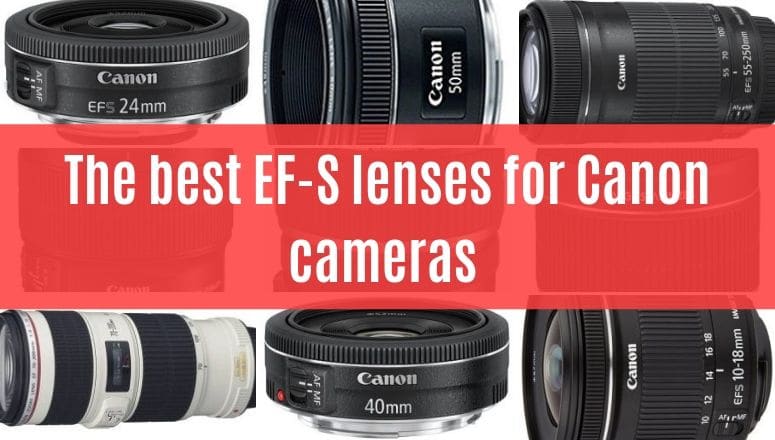





2 thoughts on “The best Canon EF-S lenses: 2024 Buying Guide”